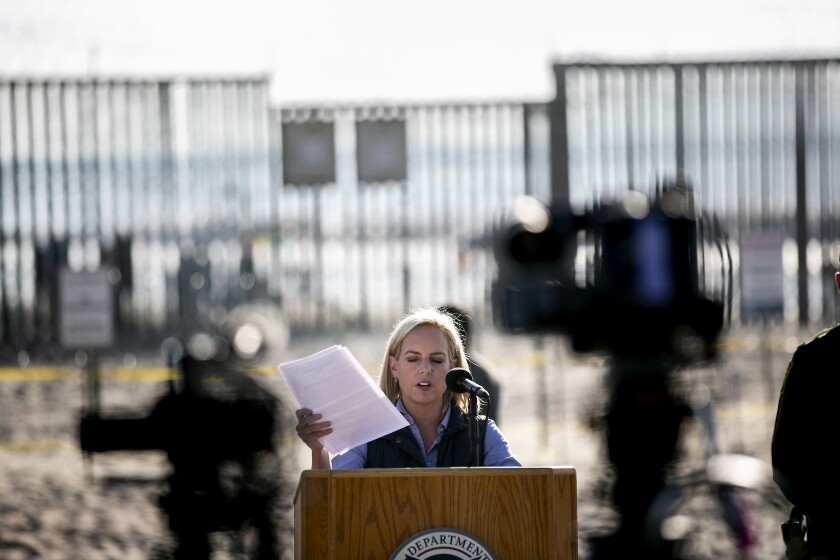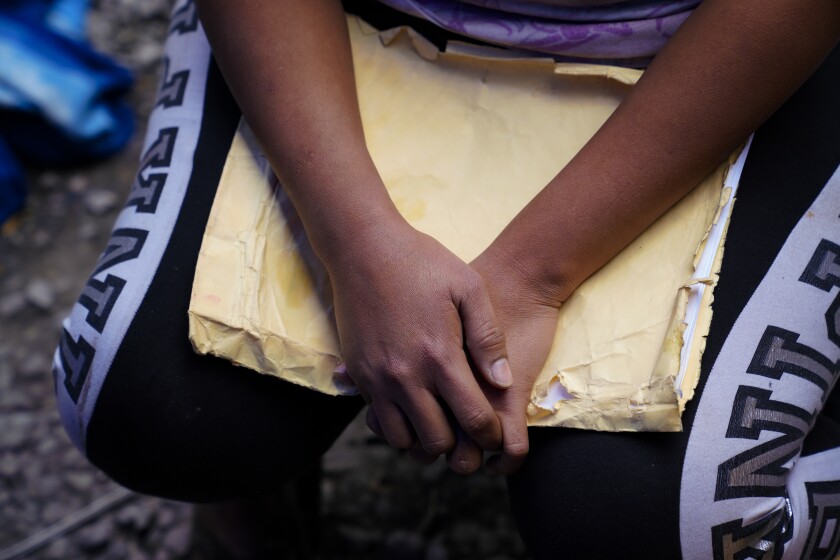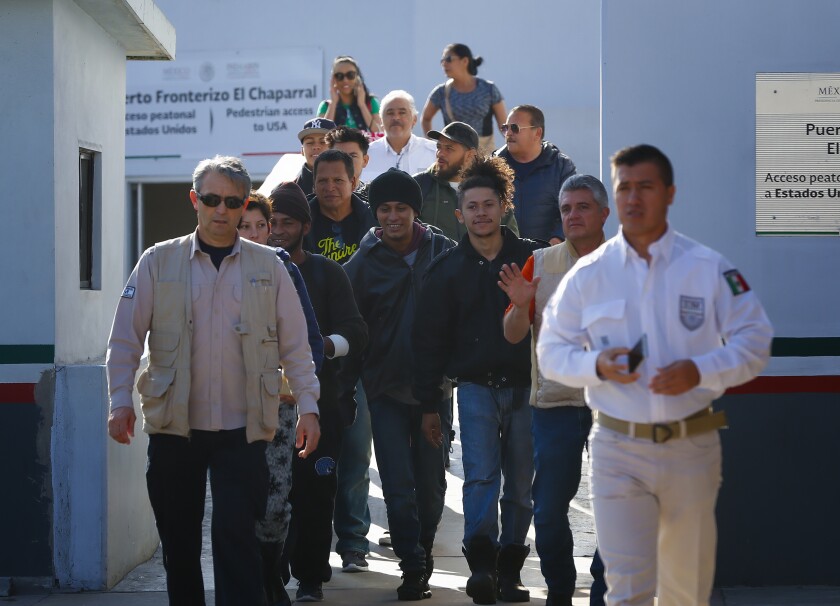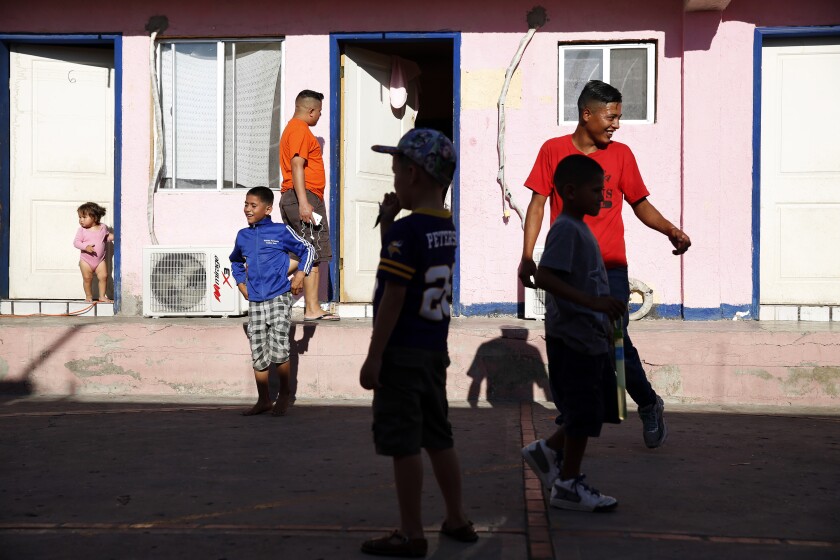
Click here to view the original news story.
A woman from Honduras loaded into the back of an SUV early on Tuesday outside a migrant shelter in Mexicali with her two young daughters.
The woman, who asked to be identified only by her first initial K., was about to begin her journey to Tijuana and then across the border to appear before a U.S. immigration judge for the first time in her asylum case. Her partner kissed her goodbye. Though they had asked for protection in the U.S. together, his case was scheduled to begin weeks after hers.
K. clutched her 1-year-old daughter tightly in her arms. Her 4-year-old squeezed into the seat beside her next to another woman holding her three-year-old daughter.
Asylum seekers returned by the U.S. government to Mexicali to wait for their immigration court cases do not go to the immigration court in Imperial, Calif. They have to find a way travel more than 100 miles to the San Ysidro Port of Entry in Tijuana to go to hearings in San Diego.
On Thursday, 26 of the 47 people returned to Mexicali scheduled for court, or 55 percent, managed to get there.
The program, officially called Migrant Protection Protocols and known by many as “Remain in Mexico,” began under the Trump administration in January at the port of entry in Tijuana. It expanded slowly at first, adding asylum seekers arriving at ports of entry in Calexico and parts of Texas as well as those caught crossing illegally by Border Patrol.
One of former Homeland Security Secretary Kirstjen Nielsen’s last acts was to begin a rapid ramp up of the program. That paused when a federal judge temporarily blocked the policy, but it has since resumed at full force following an appeal of that decision.

At the beginning of March, 157 people seeking asylum had been returned. As of Friday, May 10, according to a Mexican official, more than 2,800 had been sent back to Baja, the Mexican state that includes both Tijuana and Mexicali. Of those, just over 900 went to Mexicali, an official said.
Neither the U.S. government nor the Mexican government helps the asylum seekers returned to Mexicali get to Tijuana for court.
Eleven of the people who made it were supported by two U.S. citizens volunteering in Mexicali and another small group of Mexican citizens in Tijuana.
Through Border Kindness, Kelly Overton and fellow volunteer Yolanda Brown help migrants in Mexicali shelters access food and other basic needs. Brown has created a list of returnees and their court dates to track when asylum seekers need to take buses to Tijuana. She has already added more than 200 people.
On the Tijuana side, volunteers with Families Belong Together pay for hotels for the returnees until they cross the border for court.
As of Friday, the groups had helped 57 people board buses bound for Tijuana, including K. and her two daughters.
“Most of these people wouldn’t have gotten to Tijuana without us,” Kelly Overton said.
He and Brown drive around to Mexicali’s shelters in the morning to pick up people whose court hearings are two days away. When there are more than will fit into their two cars, which is frequent, they pay taxis to help them transport the crowd to a bus station.
Overton worries about the migrants who they’re not able to find.
“From the moment they leave Central America, someone is trying to exploit them,” Kelly Overton said. “For every one person trying to help them, there’s 100 trying to exploit them.”

Those scheduled to leave Tuesday followed Overton and Brown into the bus station, their expressions a mixture of nervous and grateful. One young girl carried a plastic toy castle with her.
Overton handed out 50 pesos per person to each family in addition to paying their bus fares — 395 pesos per adult, half price for children between 5 and 10 years old and free for children younger than that.
All of the money going to pay for the asylum seekers’ travel expenses are from private donations, he said. He’s worried about what will happen if and when the money runs out.
A woman from El Salvador said she felt like giving up when she and her 14-year-old daughter were first returned to Mexicali before they found Border Kindness.
“We don’t know here,” she said in Spanish. “My daughter told me, ‘Let’s fight. Maybe there’s a way to find people to help.’ Now we’re going.”
She’d been hoping to reach her older daughter in Virginia, who came to the U.S. several years ago and was already given permission to stay.
Some days they weren’t able to eat in Mexicali because they didn’t have money and the shelter didn’t have food, she said.
“How did I have such bad luck to be returned?” she said.
The group boarded a bus after hugging Brown goodbye.
They selected snacks offered by the bus service and settled in to plush seats with video displays for the two-and-a-half hour ride. Other than the group of asylum seekers, the bus only had a couple of passengers.
K. settled into her seat next to her friend with both of her daughters in her lap. They watched Disney’s “Coco” as the bus headed out of Mexicali.
Soon after, the 1-year-old, snuggled into a Mini Mouse blanket, fell asleep in K.’s arms. Through gaps in the bus’s curtains, dusty desert mountains rolled by outside.
K. explained that she and her family fled Honduras after her brother was killed and they received a threat at their house.
Initially, they planned to stay in Chiapas, but the people threatening them found them there, and they had to flee farther north.
They crossed illegally into the U.S. after reaching Mexicali and surrendered themselves to Border Patrol to ask for asylum, she said. They had planned to go stay with her father, who is here on a visa and living in Alabama.
Her other brother fled Honduras about a year ago and has been living with their father while he waits for his court case.
When the group reached the bus station in Tijuana, Maria Lourdes Arias, a volunteer with Families Belong Together, was waiting to greet them.
All 14 asylum seekers piled into Arias’s van, and she drove them to the hotel in Zona Centro. None of the asylum seekers had ever been to Tijuana.
“I’ve heard Tijuana is dangerous,” said the one father in the group, who was traveling with his 7-year-old daughter.

Like any other city, Arias responded, there are dangerous parts and parts that are fine.
She took them to eat and told them to relax the rest of the day. They would visit attorneys with Al Otro Lado, a legal services organization that supports migrants in Tijuana, the next day to learn what to expect in court.
On Thursday, she said, they would take an Uber to the border to present for their hearings.
When they arrived around 8 a.m. on Thursday, an official at the port of entry told K. that there had been a mistake. Her name wasn’t on the list of people to let into court. She would have to come back again in a few weeks.
She found her own way back to her partner in Mexicali while the rest, escorted by Immigration and Customs Enforcement officers, rode a government bus to downtown San Diego.
They were among nearly 100 returnees who had court in San Diego that day, according to a court official. Three judges were scheduled to hear cases.
Judge Jesús Clemente heard all of the Calexico cases on Thursday, his first day of MPP hearings.
Instead of calling each cases to come before him to speak individually, he spent most of the 45 minutes that the asylum seekers were present before him addressing them as a group.
“This is very complicated,” Clemente told them. “I’m going to try to get through this as quickly as I can so you can take care of your children.”
The room already murmured with the babble and cries of the youngest there.
He explained that the Department of Homeland Security had failed to file required documents in many of their cases, meaning that they couldn’t start the process that day.
He called the cases of the eight people whose paperwork had been correctly filed. He asked them to say their full names and whether they wanted to fight their cases. Then he scheduled for them to come back in July and sent them out to the lobby.
The rest, including the 11 whose trips had been paid by Border Kindness and Families Belong Together, would have to return in June. Their court cases had not yet officially begun.
Before sending them out to join their fellow asylum seekers, Clemente said he wanted to offer them some advice. Get a lawyer, he emphasized, if you can find one.
“I don’t know how you’re going to do this in Mexico to be honest with you,” he said. “You’re really in a very tough situation.”
Meanwhile, Families Belong Together and Border Kindness are trying to figure out what to do with asylum seekers once they’re sent back to Mexico from their court hearings. Should they stay in Tijuana since they have to be back there in a month or two? Should they go back to Mexicali where they at least know a little bit of the city?
Either way, Overton said, the already-packed shelters in both cities will soon be so overburdened that returnees will have no place to go. The same day the group of 14 left Mexicali, 74 more were returned for the first time to wait.

